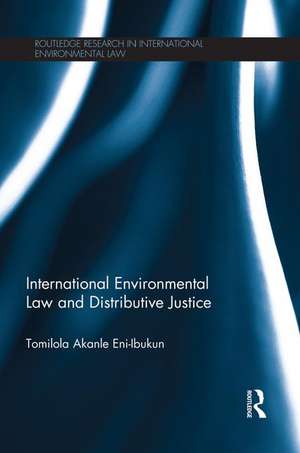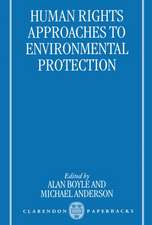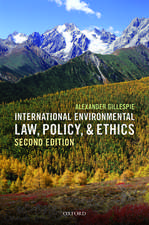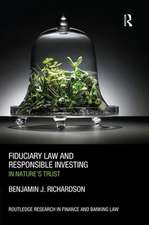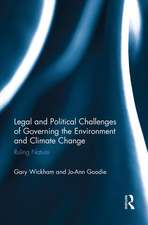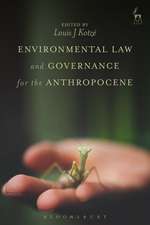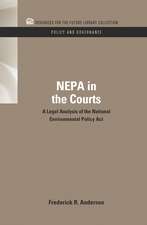International Environmental Law and Distributive Justice: The Equitable Distribution of CDM Projects under the Kyoto Protocol: Routledge Research in International Environmental Law
Autor Tomilola Akanle Eni-Ibukunen Limba Engleză Paperback – 18 iul 2015
This book looks at distributive justice under the CDM regime and focuses on the issue of equity in the geographic distribution of CDM projects among developing countries. The book investigates relevant aspects of international law to identify the legal characteristics of equitable distribution or distributive justice, in order to establish what equitable distribution in the CDM should look like. Based on these investigations, Tomilola Akanle Eni-Ibukun breaks new ground in defining equitable distribution under the CDM and exploring how key obstructions to the equitable distribution of projects may be overcome.
The book will be of particular interest to academics and policymakers of climate change and the CDM within international law.
| Toate formatele și edițiile | Preț | Express |
|---|---|---|
| Paperback (1) | 108.70 lei 43-57 zile | |
| Taylor & Francis – 18 iul 2015 | 108.70 lei 43-57 zile | |
| Hardback (1) | 557.56 lei 22-36 zile | |
| Taylor & Francis – 5 noi 2013 | 557.56 lei 22-36 zile |
Din seria Routledge Research in International Environmental Law
-
 Preț: 311.62 lei
Preț: 311.62 lei -
 Preț: 325.89 lei
Preț: 325.89 lei - 16%
 Preț: 296.73 lei
Preț: 296.73 lei - 18%
 Preț: 1006.07 lei
Preț: 1006.07 lei -
 Preț: 416.22 lei
Preț: 416.22 lei -
 Preț: 436.14 lei
Preț: 436.14 lei -
 Preț: 389.38 lei
Preț: 389.38 lei -
 Preț: 384.70 lei
Preț: 384.70 lei - 25%
 Preț: 766.65 lei
Preț: 766.65 lei -
 Preț: 329.06 lei
Preț: 329.06 lei - 16%
 Preț: 299.45 lei
Preț: 299.45 lei -
 Preț: 424.16 lei
Preț: 424.16 lei - 12%
 Preț: 299.03 lei
Preț: 299.03 lei -
 Preț: 416.22 lei
Preț: 416.22 lei - 18%
 Preț: 1000.27 lei
Preț: 1000.27 lei -
 Preț: 415.67 lei
Preț: 415.67 lei -
 Preț: 432.29 lei
Preț: 432.29 lei - 21%
 Preț: 270.82 lei
Preț: 270.82 lei -
 Preț: 389.38 lei
Preț: 389.38 lei -
 Preț: 489.26 lei
Preț: 489.26 lei - 19%
 Preț: 246.31 lei
Preț: 246.31 lei - 14%
 Preț: 300.09 lei
Preț: 300.09 lei - 15%
 Preț: 420.20 lei
Preț: 420.20 lei - 8%
 Preț: 326.01 lei
Preț: 326.01 lei - 18%
 Preț: 1068.77 lei
Preț: 1068.77 lei -
 Preț: 461.66 lei
Preț: 461.66 lei - 18%
 Preț: 1054.27 lei
Preț: 1054.27 lei - 20%
 Preț: 262.75 lei
Preț: 262.75 lei - 16%
 Preț: 322.56 lei
Preț: 322.56 lei - 18%
 Preț: 1065.06 lei
Preț: 1065.06 lei - 18%
 Preț: 1065.06 lei
Preț: 1065.06 lei
Preț: 108.70 lei
Nou
Puncte Express: 163
Preț estimativ în valută:
20.81€ • 22.61$ • 17.49£
20.81€ • 22.61$ • 17.49£
Carte tipărită la comandă
Livrare economică 21 aprilie-05 mai
Preluare comenzi: 021 569.72.76
Specificații
ISBN-13: 9781138937499
ISBN-10: 1138937495
Pagini: 166
Dimensiuni: 156 x 234 mm
Greutate: 0.22 kg
Ediția:1
Editura: Taylor & Francis
Colecția Routledge
Seria Routledge Research in International Environmental Law
Locul publicării:Oxford, United Kingdom
ISBN-10: 1138937495
Pagini: 166
Dimensiuni: 156 x 234 mm
Greutate: 0.22 kg
Ediția:1
Editura: Taylor & Francis
Colecția Routledge
Seria Routledge Research in International Environmental Law
Locul publicării:Oxford, United Kingdom
Public țintă
Postgraduate and UndergraduateCuprins
Part 1 Introduction 1. Introduction 2. The Clean Development Mechanism Part 2 Defining Equitable Distribution 3. Equity in the International Climate Change Regime 4. International Law’s Approach to Distributive Justice 5. Meaning of Equitable Distribution of CDM Projects 6. Distribution of CDM Projects in Practice – Is the Current Distribution Equitable? Part 3 Achieving Equitable Distribution of CDM Projects 7. Barriers to Equitable Distribution Part 1 8. Barriers to Equitable Distribution Part 2 9. Measures for Promoting Equitable Distribution 10. Lessons for a New Market Mechanism and Recommendations 11. Conclusion
Descriere
The Clean Development Mechanism (CDM) is widely regarded as one of the Kyoto Protocol’s best creations and as an essential part of the international climate change regime. The CDM has registered over 6,000 projects, and is constantly evolving to ensure that it fulfils its objectives of mitigating climate change. Nevertheless, the CDM is not perfect, and one of its main problems is the inequitable geographic distribution of projects among developing countries. This book looks at distributive justice under the CDM regime and focuses on the issue of equity in the geographic distribution of CDM projects among developing countries. The book investigates relevant aspects of international law to identify the legal characteristics of equitable distribution or distributive justice, in order to establish what equitable distribution in the CDM should look like.
